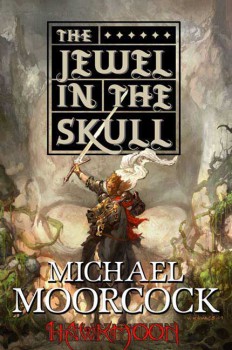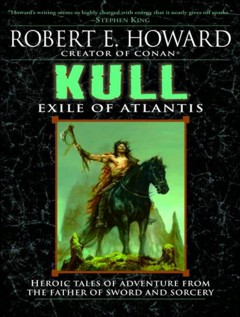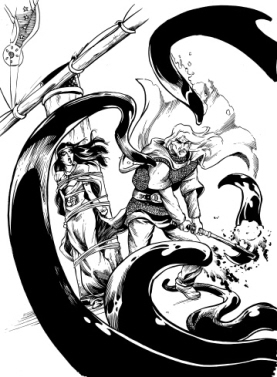Michael Moorcock on the Birth of Hawkmoon
 Last week Tor.com ran a terrific article by Michael Moorcock about the origins of his (recently reprinted) Hawkmoon stories. In ‘The Genesis of Hawkmoon‘ Moorcock talks about method, motive, and how the big cultural changes of the sixties heavily influenced his work. Firstly, the man’s writing MO is legendary, and he wrote fantasy fiction with a journalistic mindset: fast with no revisions. The political elements of Hawkmoon, in which a far-future Britain is the ‘Dark Empire’ opposed by a German hero, was a direct protest of the lingering prejudice and division left over from WWII in England. Moorcock sees the books, and himself, as a product of the times — and the times they were a’ changing.
Last week Tor.com ran a terrific article by Michael Moorcock about the origins of his (recently reprinted) Hawkmoon stories. In ‘The Genesis of Hawkmoon‘ Moorcock talks about method, motive, and how the big cultural changes of the sixties heavily influenced his work. Firstly, the man’s writing MO is legendary, and he wrote fantasy fiction with a journalistic mindset: fast with no revisions. The political elements of Hawkmoon, in which a far-future Britain is the ‘Dark Empire’ opposed by a German hero, was a direct protest of the lingering prejudice and division left over from WWII in England. Moorcock sees the books, and himself, as a product of the times — and the times they were a’ changing.
Finally, Moorcock expresses his quiet astonishment over the longevity of Hawkmoon and all the Eternal Champion stories, and remarks “Not bad, I guess, for twelve days hard work!”
No, Mr. Moorcock, not bad at all.
 The Sorcerer’s Guild
The Sorcerer’s Guild  I wanted to point all of you to the fine series of articles over on
I wanted to point all of you to the fine series of articles over on  The Sorcerer’s Guild announced this week that John C. Hocking’s “The Face in the Sea” (from Black Gate 13) has been nominated for the Harper’s Pen Award (formerly the Ham-Sized Fist Award).
The Sorcerer’s Guild announced this week that John C. Hocking’s “The Face in the Sea” (from Black Gate 13) has been nominated for the Harper’s Pen Award (formerly the Ham-Sized Fist Award). Most pulp writers of the 1930s were itching to break into the hardcover book market. Since reprints of pulp stories in book form were rare at the time, these writers did not expect that their work for the newsstands would survive past an issue’s sell-date. They felt comfortable re-working and expanding on them to create novels. Raymond Chandler famously called his process of novelizing his already published work as “cannibalizing.” He welded together different short stories, often keeping large sections of text intact with only slight alterations. Other authors took ideas that they liked, or else felt they could do more justice to in the novel format, and enlarged them into books without text carry-over. Robert E. Howard used “The Scarlet Citadel” as a guide for The Hour of the Dragon. And Cornell Woolrich turned many of his short stories into novels. “Face Work” became The Black Angel. “Call Me Patrice” became I Married a Dead Man. “The Street of Jungle Death” became Black Alibi. And “Speak to Me of Death” became Woolrich’s most depressing novel (which is really saying something), Night Has a Thousand Eyes.
Most pulp writers of the 1930s were itching to break into the hardcover book market. Since reprints of pulp stories in book form were rare at the time, these writers did not expect that their work for the newsstands would survive past an issue’s sell-date. They felt comfortable re-working and expanding on them to create novels. Raymond Chandler famously called his process of novelizing his already published work as “cannibalizing.” He welded together different short stories, often keeping large sections of text intact with only slight alterations. Other authors took ideas that they liked, or else felt they could do more justice to in the novel format, and enlarged them into books without text carry-over. Robert E. Howard used “The Scarlet Citadel” as a guide for The Hour of the Dragon. And Cornell Woolrich turned many of his short stories into novels. “Face Work” became The Black Angel. “Call Me Patrice” became I Married a Dead Man. “The Street of Jungle Death” became Black Alibi. And “Speak to Me of Death” became Woolrich’s most depressing novel (which is really saying something), Night Has a Thousand Eyes.